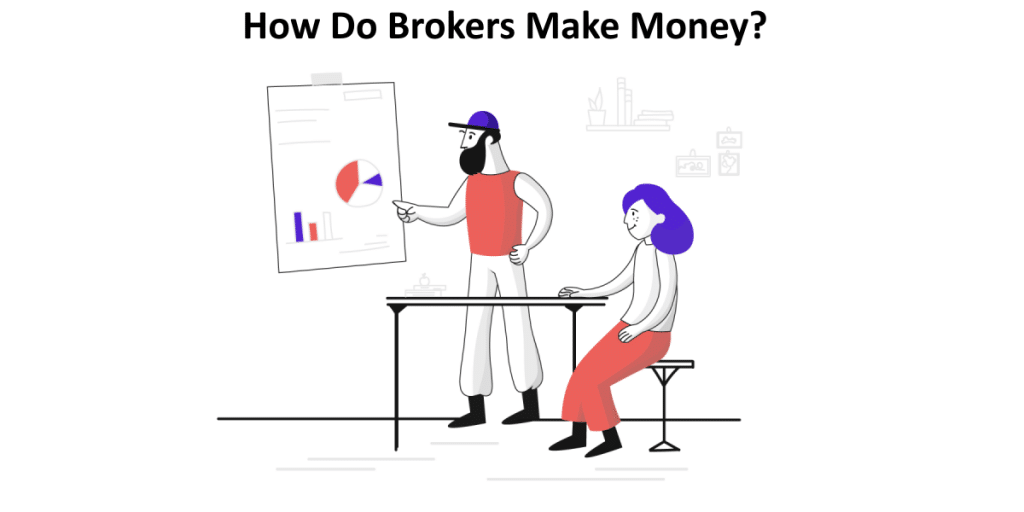Retail brokers are a business, and like any business, they’re here to make money. Brokers use a variety of different methods to make money. Some will use only one or two, while others might use more.
In this article, we go over the various methods that retail brokers use to earn money. If you’re looking to get into the world of online trading, you should pay close attention to the topics we cover here.
The methods that brokers use to earn their money are going to affect the profits you earn trading on these platforms. It will also affect which strategies you use on their platform to make money.
Some brokers use shifty tactics like hedging trades against their traders to make money, so be on the lookout for these kinds of tactics before committing to a broker. If you need to learn which countries IQ option is available, we have a list right here.
Spreads
Spreads are often incorrectly grouped in with commission fees, but the two are quite different and many brokers charge both spreads and commission.
In simple terms: the spread is the difference between actual instrument prices and the prices traders pay on their trades.
Brokers will provide buy prices that are more expensive than the actual price, and sell cheaper prices. Brokers add a markup on trade instruments and pocket the difference.
This practice is fairly common among retail brokers. Brokers who add spreads to trades should advertise their charges (in pips) on their page explaining their charges.
Commission
One of the most common forms of trading charges is commissions.
Commissions are charged as a percentage of your trade volume whenever you open or close a trade. These percentage charges are typically anywhere between 0.02% and 0.08%. It doesn’t sound like much, but if you’re taking positions worth thousands of dollars it starts adding up quickly.
If your broker works on a commission basis, the price should be automatically calculated for each of your trades.
Deposit and Withdrawal Fees
To open a position on a trading platform, you need to have accessible funds in your trading account. Many brokers have a minimum deposit required to open an account with them.
Additionally, after you’ve made a profit, you’ll want to get the money from your trading account into somewhere where you can use it.
Many brokers charge users a fee whenever they deposit or withdraw money from their accounts. These amounts tend to be flat rates rather than amounts proportional to the money that’s being transferred.
Some brokers, such as AvaTrade, give their users a certain amount of free transactions every month. Others have free transactions to certain types of accounts.
Cryptocurrency is becoming more and more common among retail brokers. Recently, a few of them provide free transactions to and from cryptocurrency wallets.
Inactivity Fees
This is one of the areas where newer traders run into unexpected charges. Brokers earn their money when traders are actively trading on their platform. So they need to encourage their users to stay active and keep trading.
Many brokers charge some sort of inactivity fee for traders who haven’t opened a position after a set period. These fees are often very high and deplete whatever funds are left in the account in a matter of months.
Most brokers charge inactivity fees. New users shouldn’t worry about being active all the time, though. Most of the inactivity fees only begin after at least six months of inactivity. These charges are often as high as $50 a month, which very quickly empty an account.
If you have an account that you haven’t used in a while, it’s a good idea to go and withdraw the funds that are left in the account. Otherwise, that money will go straight to your broker.
Overnight Fees
These kinds of charges are less common among the popular brokers such as eToro and Plus500. However, lots of smaller brokers charge overnight fees.
Brokers will charge users a percentage-based amount to keep their position after trading markets close for the day. This is especially common if you’re trading on leveraged margins.
Traders who use short-term strategies such as day-trading and scalping get around these charges by never keeping positions open for more than a couple of hours.
If you’re trying out long-term trading strategies, keep an eye on your overnight fees. Even if you trade at a loss, you will still be liable to pay the overnight fees on your position.
Trading Against Users
This is a less common way for brokers to make money, and it’s becoming rarer as they move towards a No Deal Desk model.
Brokers that use a Dealing Desk Model (a concept we’ve covered in other articles), provide liquidity to traders using their platform.
In short, this means that every time a trader opens a position, the broker then takes the opposite end of that trade. This is especially common with CFD and Forex brokers.
Sometimes these brokers will “hedge” a trade by passing that liquidity on to another trader on the platform.
When brokers use this technique, they earn a profit when their traders lose. If a trader makes a profitable trade, the broker is the one who has to pay them out.
Many traders avoid these kinds of Dealing Desk Brokers because of potential conflict of interest. You want to work with a broker that has your best interest in mind and is not actively working against you.
Conclusion
There are several different methods that brokers use to earn their money. Some of these are more nefarious than others, but every broker is going to use at least one of them.
Most retail brokers use some combination of the above methods.
Before committing to a broker, make sure you read through their pricing terms thoroughly. The last thing you want is to run into unexpected costs that start to eat into your profits.
Good luck and happy trading.
